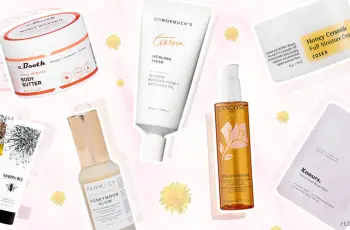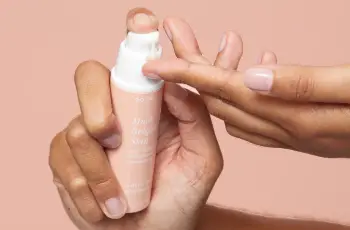
When you want to lock in moisture and fight signs of aging, consider hyaluronic acid your go-to skincare ingredient for healthy, plump, and glowing skin.
This ingredient works fast, and it’s found in serums, moisturizers, cleansers, and more—making it a versatile essential in virtually every skincare category.
There’s a reason why hyaluronic acid shows up in so many products: it’s a hydration powerhouse and a key player in minimizing fine lines and wrinkles.
Hydrated skin naturally appears fuller and more youthful, and that’s where hyaluronic acid truly shines as a moisture magnet and skin plumper.
Scientifically speaking, hyaluronic acid is a group of sugar molecules known as polysaccharides that act as buffers and lubricants in the body’s connective tissues.
The Cleveland Clinic explains that these sugar molecules are found naturally in the body, especially in the eyes, joints, and skin, contributing to elasticity and volume.
Unfortunately, the body’s natural hyaluronic acid production decreases with age, and environmental factors like pollution and smoking can accelerate this decline.
While this is bad news for skin health, the good news is that topical hyaluronic acid can replenish what’s been lost and restore hydration levels in the skin.
Dr. Bonnie Gasquet, an internist in Louisiana, explains that hyaluronic acid binds water molecules to the skin, significantly boosting hydration levels.
Board-certified dermatologist Dr. Shari Marchbein adds that it can hold over 1,000 times its own weight in water, making it incredibly effective at skin hydration.
The main benefit of hyaluronic acid is its unmatched ability to hydrate and retain moisture, which is crucial for healthy, supple, and resilient skin.
When the top layer of skin lacks moisture, it can appear dry, flaky, rough, and even become more prone to damage from external irritants.
Dr. Marchbein warns that a compromised moisture barrier can make the skin vulnerable to bacteria and increase the risk of infections and inflammatory skin conditions.
Conditions like rosacea, acne, atopic dermatitis, and severe dry skin have all been linked to an impaired or incomplete skin barrier, according to several studies.
Hydrated skin not only looks more luminous and alive, but it also functions better in protecting the body from pollutants, bacteria, and environmental aggressors.
Research confirms that moisture loss plays a big role in visible aging, and hyaluronic acid helps delay or reverse these effects by replenishing hydration.
Thanks to its water-retaining properties, hyaluronic acid helps improve the look of dry or wrinkled skin and can visibly reduce fine lines and sagging.
In fact, one study found that an over-the-counter cream with hyaluronic acid reduced wrinkles around the eyes and lips by 10–20% in just three months.
That same study showed that skin firmness improved by as much as 30%, reinforcing the anti-aging and hydrating power of hyaluronic acid in topical products.
Dr. Gasquet recommends using hyaluronic acid, especially during winter months when dry indoor air and cold weather strip moisture from the skin.
Even people who don’t have dry skin can benefit from this ingredient, as it boosts overall glow and supports skin structure at every age.
Dr. Kenneth Rothaus, a plastic surgeon in New York, says hyaluronic acid is responsible for the radiant, fresh glow that healthy skin naturally exhibits.
Dr. Marchbein advises people of all ages to start using a moisturizer rich in hyaluronic acid—it’s never too early to prioritize hydration and barrier care.
There are three main types of hyaluronic acid used in skincare, each offering different levels of penetration and hydration benefits depending on your skin’s needs.
Hydrolyzed hyaluronic acid has been broken into smaller components to penetrate the skin surface more easily, making it suitable for oily or combination skin types.
Sodium hyaluronate is a deeper-penetrating version that delivers better hydration results, though its effects may not last as long as other types.
This ingredient is often found in serums aimed at delivering quick hydration without weighing down the skin or leaving a greasy residue.
Acetylated sodium hyaluronate has the benefits of sodium hyaluronate but with more long-lasting hydration, ideal for dry climates and very dry skin types.
It’s perfect for people looking for sustained moisture, including those with dry skin, living in arid conditions, or experiencing harsh seasonal weather.
Ingestible forms of hyaluronic acid, like supplements or capsules, are gaining popularity and may provide internal hydration benefits when taken regularly.
One study showed that people who took 120 mg of oral hyaluronic acid daily for 12 weeks experienced fewer wrinkles and improved skin texture.
Still, more research is needed to fully confirm the effectiveness of ingestible hyaluronic acid for long-term skin improvement.
Dr. Marchbein says topical hyaluronic acid is generally safe for all skin types and rarely causes side effects when used as directed in skincare routines.
Since hyaluronic acid is a substance the body naturally produces, most people tolerate it well, even when used daily on sensitive skin.
If reactions occur, it’s usually due to preservatives or added ingredients rather than the hyaluronic acid itself, says dermatologist Dr. Rossos.
Preservatives like parabens, formaldehyde releasers, or isothiazolinones are known to cause irritation and should be avoided by sensitive skin types.
Injectable fillers containing hyaluronic acid are also popular, but these should always be administered by board-certified professionals to minimize risk.
Dr. Marchbein warns that the ingredient is safe, but the procedure carries risks that require experienced, certified dermatologists or plastic surgeons.
Hyaluronic acid is found in nearly every skincare product category, including serums, creams, cleansers, masks, eye creams, and even lip treatments.
When shopping, look for hyaluronic acid paired with other beneficial ingredients like vitamin C, which boosts effectiveness and offers antioxidant protection.
Always check the label for allergens or ingredients you know your skin is sensitive to before trying a new product with hyaluronic acid.
If a product lists hyaluronic acid’s molecular weight, it’s a good sign—the lower the weight, the deeper it can penetrate into the skin’s layers.
For example, 50 kilodaltons (kDa) penetrates more easily than 2,000 kDa, and products with lower weights have shown more visible wrinkle-reducing effects.
Even a 0.1% concentration of hyaluronic acid can offer increased skin hydration and elasticity, although most products contain between 1% and 2%.
Avoid products that contain drying alcohols like isopropyl alcohol, which counteract hyaluronic acid’s moisturizing effects and damage the skin barrier.
Alcohols high in the ingredient list signal potential drying effects, and they can lead to cracked, flaky skin and even increase the risk of breakouts.
Gasquet warns that alcohol dries out cells, making them less plump and hydrated—the opposite effect of what hyaluronic acid is supposed to provide.
Added fragrance in skincare can also cause irritation and allergic reactions, especially for people with sensitive or reactive skin types.
Dr. Nazanin Saedi explains that fragrances are a common trigger for contact dermatitis, a delayed rash that can occur after exposure to certain irritants.
You’ll often see water listed as the first ingredient in hyaluronic acid products, which is actually a good thing because it helps boost effectiveness.
Water-based products penetrate skin more easily than oil-based ones and help activate hyaluronic acid’s water-attracting properties more efficiently.
In summary, hyaluronic acid is a skin-saving molecule that locks in moisture, plumps skin, supports barrier health, and helps reduce visible signs of aging.
Choose the right formulation for your skin type, watch out for harsh additives, and pair hyaluronic acid with other nourishing ingredients for best results.
Hydrated, healthy-looking skin starts with consistency, and incorporating hyaluronic acid into your routine can transform your complexion over time.


